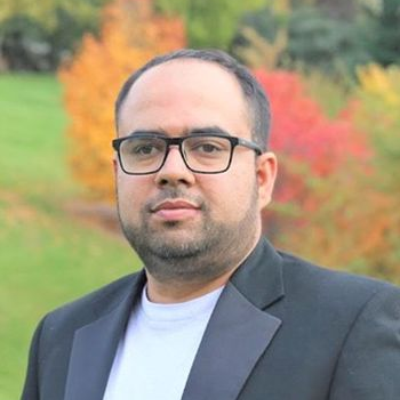MSU researcher receives $800K grant to study interregional reliance, carbon program impacts on US forest product industries
A multi-institutional research team led by Raju Pokharel, an assistant professor in the MSU Department of Forestry, will study interstate and interregional reliance of wood and how carbon offset programs impact forest product industries.
EAST LANSING, Mich. — A researcher at Michigan State University has received an $800,000 grant from the U.S. Department of Agriculture’s National Institute of Food and Agriculture (USDA NIFA) to study the reliance of wood between regions and impacts of carbon offset programs on forest product industries.
Raju Pokharel, an assistant professor in the MSU Department of Forestry, will lead a team looking at how the supply chain of wood products is connected across states and regions and how carbon offset programs affect wood flow, forest investments and raw material sourcing for forest product industries. The team will also estimate potential leakage, the shift in harvesting and production of timber from one region to another when policies or programs are implemented in an area.

Through preliminary research, Pokharel and his team have identified a key knowledge gap in this space. During a time when policymakers, scientists, industry leaders and producers have worked to identify solutions to limit the amount of excess carbon in the atmosphere — a leading cause of climate change — carbon offset programs have become popular for landowners because of the credits received based on the amount of carbon their forests sequester.
As carbon offset projects and programs continue growing, it’s unknown to what extent their impacts will have on forest management practices and wood products harvested for forest product industries, in addition to the scope at which harvesting is substituted from one region to another, resulting in leakage.
“As more forests enroll in these carbon offset programs, our team is going to evaluate what will happen to the wood supply and forest product industries,” Pokharel said. “What will happen to trade? Are we going to import more or export more wood? Is the price of wood going to go up or down? And if one forest enrolls in a carbon offset program, will another forest in a different part of the country harvest more wood to meet that demand? What would be the amount of leakage? These are all questions we’re going to answer through this project.”
Modeling and analysis from the project will be carried out at a national scale to account for interstate and interregional reliance on forest product industries, including in the Mountain, Northeast, Northwest and Southern U.S. regions. Along with MSU, Colorado State University, Oklahoma State University, and the University of Idaho are current partners on the project.
Pokharel and his team will conduct a meta-analysis using literature, reports, policies and databases to identify how inputs such as carbon offset programs, carbon policies (including goals set to become net-zero by 2050), market prices and the supply chain of timber relate to and influence each other. They will also hold stakeholder meetings among suppliers, producers, consumers and other key players to understand how they’re affected when different scenarios occur.
“Historically, carbon offset programs have been looked at unidirectionally, and I believe we have to look at them from all directions,” Pokharel said. “These are novel programs, and we should do them and have been doing them, but we should do them right because they’re just a part in a big ecosystem and economy.”
For example, as it relates to the economy, Pokharel asked if more forests in a region enlist into carbon offset programs, what might happen to the local lumber mills if the supply of wood decreases due to a lack of harvesting? If lumber mills begin to close in the region, then who’ll produce timber products and where will the wood come from?
Pokharel said this scenario could lead to leakage, an aspect he said hasn’t been studied enough when it comes to carbon offset programs. If forests aren’t being harvested in one region, Pokharel said that may prompt forests to be overharvested in another region.
“We have to create a balance,” Pokharel said. “If a forest is enrolled in a carbon offset program in one region, we don’t know if the carbon is fully captured, partially captured or not captured at all because not harvesting in one region might change the harvesting pattern in another region, negating the intentions of the carbon offset program.
“The demand for wood hasn’t changed. In fact, it might increase. We build with it and store carbon in its harvested products. Doing these are all good, but we need to make strategic decisions around how we do them so that they’re effective.”
The project is funded through 2029. Pokharel said findings from this research will be shared in academic journals, as well as in presentations, workshops and fact sheets from his team.
Michigan State University AgBioResearch scientists discover dynamic solutions for food systems and the environment. More than 300 MSU faculty conduct leading-edge research on a variety of topics, from health and climate to agriculture and natural resources. Originally formed in 1888 as the Michigan Agricultural Experiment Station, MSU AgBioResearch oversees numerous on-campus research facilities, as well as 15 outlying centers throughout Michigan. To learn more, visit agbioresearch.msu.edu.



 Print
Print Email
Email




